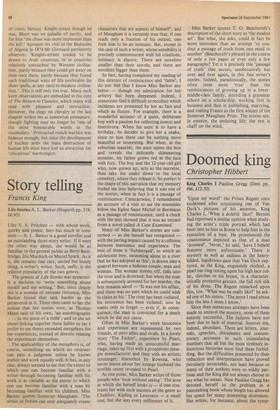Story telling
Francis King
Life Stories A. L. Barker (Hogarth pp. 319, £6.95) Like V. S. Pritchett — with whose work, quirky and poetic, hers has much in common — A. L. Barker is a good novelist and an outstanding short-story writer. If it were the other way about, she would be as familiar to the general public as Beryl Bainbridge, Iris Murdoch or Muriel Spark. As it is, she remains that rare, envied but lonely thing, a writer's writer. Such, sadly, is the relative popularity of the two genres.
The genesis of Life Stories was apparently a decision to 'write something about myself and my writing.' But, since clearly she is a woman of extreme reticence, Miss Barker found that task harder as she persevered at it. There then came to her the notion that her stories were, as Thomas Mann said of his own, 'an autobiography . . . in the guise of a fable'; and so she set about linking together these fables or (as I prefer to see them) extended metaphors for her experiences, instead of directly relating the experiences themselves.
The applicability of the metaphors is, of course, something on which no reviewer can pass a judgment unless he knows author and work equally well. It has, in any case, always seemed to me that the extent to which one can become familiar with a writer • through becoming familiar with his work is as variable as the extent to which one can become familiar with a man by becoming familiar with his children. Miss Barker quotes Somerset Maugham: 'The writer of fiction can only adequately create characters that are aspects of himself': and of Maugham it is certainly true that, if one reads only a fraction of his output, one feels him to be an intimate. But, except in the case of such a writer, whose sensibility is precisely commensurate with his creations, intimacy is elusive. There are novelists smaller than their novels; and there are novelists bigger than them.
In fact, having completed my reading of this mixture of reminiscence and 'fable', I do not feel that I know Miss Barker any better — though my admiration for her artistry has been deepened. Indeed, I sometimes find it difficult to recollect which incidents are presented by her as fact and which as fiction. For example, there is a wonderful account of a quiet, deliberate boy with a passion for collecting insects and insectivora. When his aunt is to have a birthday, he decides to give her a snake, since to him there can be nothing more beautiful or interesting. But when, at the suburban teatable, the aunt opens the box and reveals the delicately shimmering monster, his father grows red in the face with fury. The boy and the 12-year-old girl who, now grown up, acts as the narrator, then take the snake down to the local cemetery, where they release it. So perfect is the shape of this narration that my memory fooled me into believing that it was one of the stories, when in fact it is a passage of reminiscence. Contrariwise, I remembered an account of a visit to see the mummies below the Eglise Saint Michel in Bordeaux as a passage of reminiscence, until a check with the text showed that it was an extract from a novel called A Case Examined.
Many of Miss Barker's stories are concerned — as she herself has recognised — with the jarring impact caused by a collision between innocence and experience. The best of these is 'Submerged', in which an adolescent boy, swimming alone in a river that he has adopted as 'his', is drawn into a quarrel between a hideous couple, man and woman. The woman storms off, falls into the river and is drowned; but when the man is subsequently arrested for her murder, the boy remains aloof — 'It was not his affair, and there was no part which he could wish to claim as his.' The river has been violated, his innocence has been violated; now he wants only to forget — even if, in consequence, the man is convicted for a death which he did not cause.
Often in Miss Barker's work innocence and experience are represented by two friends, at once allies and rivals. In a lovely story 'The Father', experience by Pearl, who, having made an unsuccessful marriage, takes up first with a prosperous meatpie manufacturer and then with an artistic scrounger; innocence by Rowena, who never learns about her strange husband the terrible secret revealed to Pearl.
At one point, Miss Barker writes of those people who 'look without seeing'. The area at which she herself looks is — if one contrasts her with such masters of the genre as Chekhov, Kipling or Lawrence — a small one; but she sees every millimeter of it. Miss Barker quotes T. 0. Beachcroft's description of the short story as 'the modest art'. But what, she asks, could in fact be more immodest than an attempt `to conduct a passage of truth from one mind to another' (Beachcroft's phrase) in the course of only a few pages or even only a few paragraphs? Yet it is precisely this 'passage of truth' that occurs, unobtrusively but over and over again, in this fine writer's stories. Indeed, paradoxically, the stories often seem more 'true' than the reminiscences of growing up in a lowermiddle-class family, attending a grammar school on a scholarship, working first in business and then in publishing, marrying, and visiting France as the first winner of the Somerset Maugham Prize. The stories are, in essence, the enduring life; the rest is chaff on the wind.


































 Previous page
Previous page